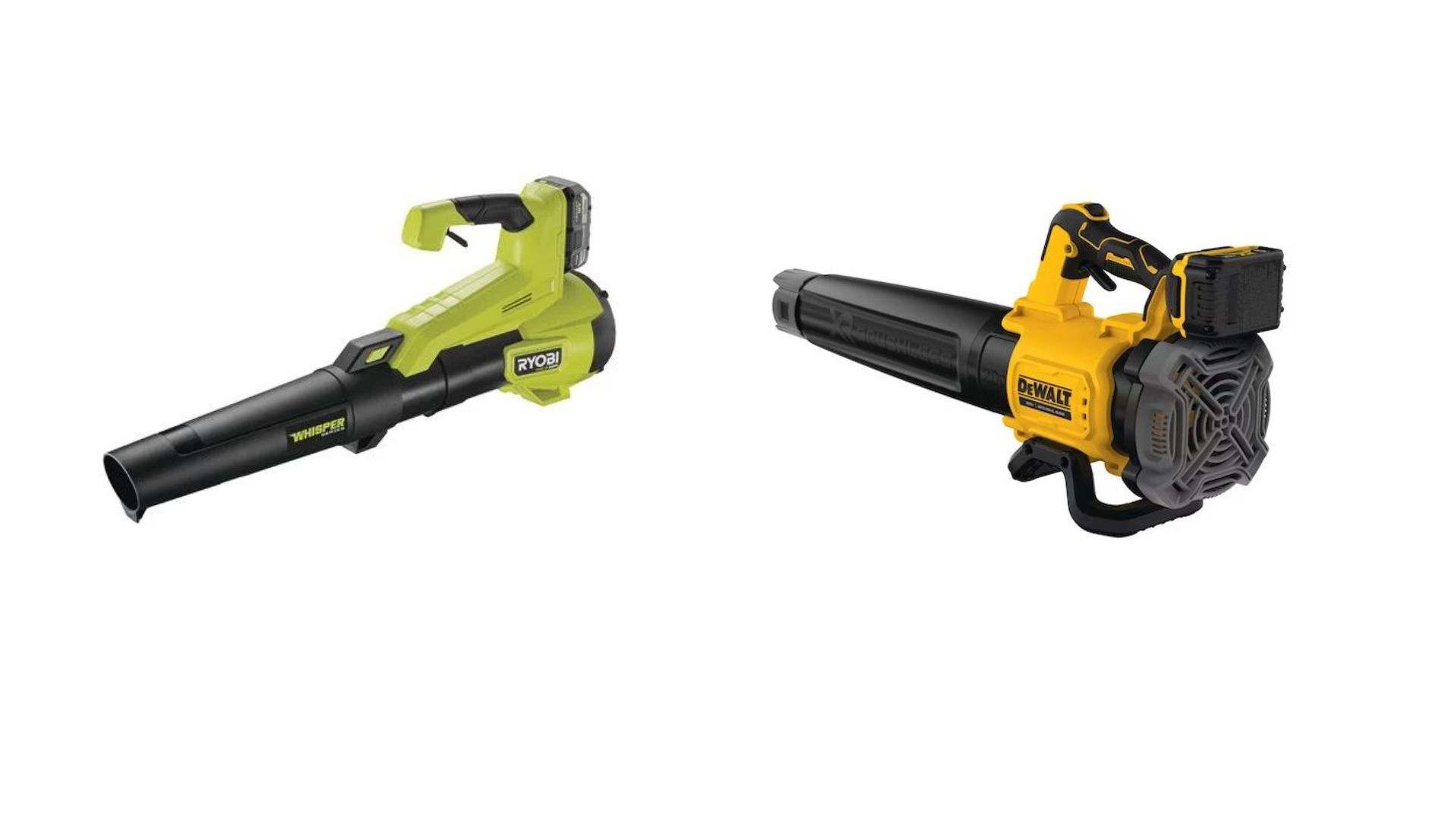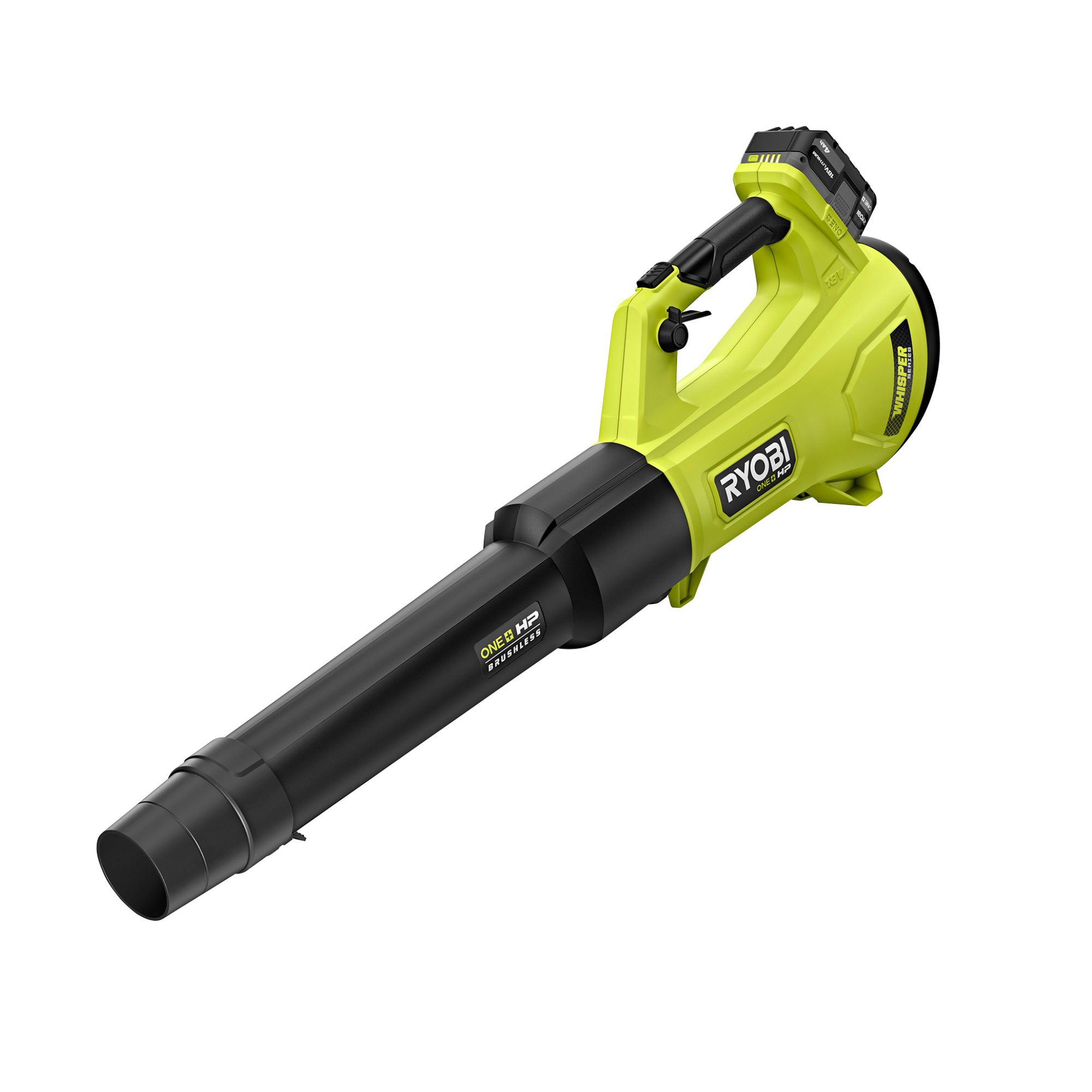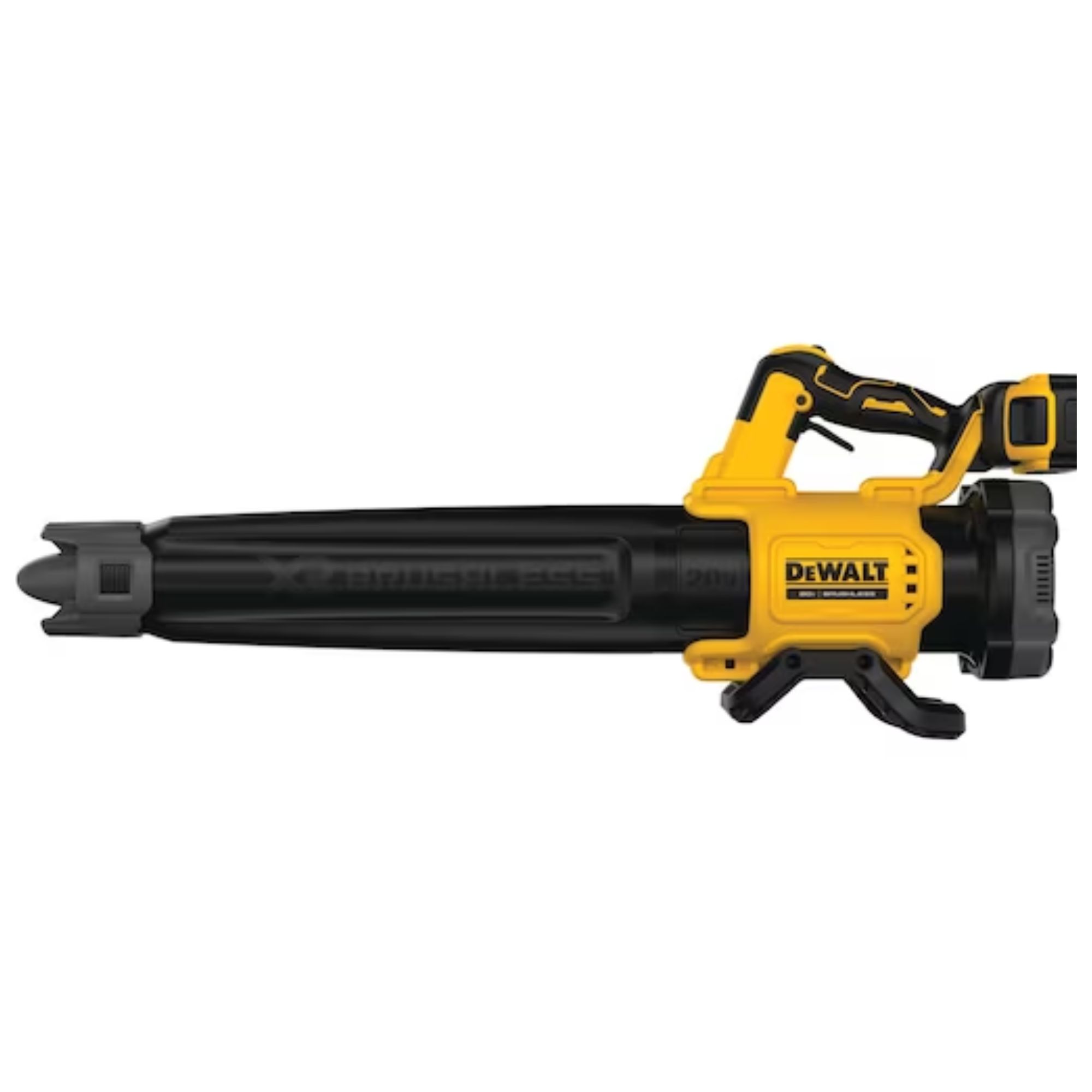Ryobi vs Dewalt: Which leaf blower is best for your yard?
We pitted Ryobi vs Dewalt leaf blowers against each other to see which blows the competition away.

The seasonal shift between summer and fall is a beautiful one, bringing colorful foliage and crisp mornings. However, it's easy to dread going out and raking the lawn or driveway in what feels like a Sisyphean cycle, which might lead you to wondering whether a Ryobi or Dewalt leaf blower is best. Putting the rake to one side and picking up a leaf blower instead can help remove stubborn leaves without raking for hours at a time. As plant expert Deborah Looi describes, leaf blowers are a ‘low effort, fuss-free way to remove leaves and debris from your lawn.’
Handheld leaf blowers, in particular, can be a good option for small-to-medium garden tasks. There are a few types of handheld blowers to choose from, including gas, corded electric, and battery-powered. Plenty of brands provide leaf blowers, but Ryobi and DeWalt stand out from the crowd.
Founded in Japan, Ryobi is one of the largest power tool manufacturers in the world. Ryobi sells a range of quality DIY and gardening tools that aim to make gardening easier and simpler. DeWalt is a leading American industrial tool company that crafts quality power tools and hand tools for homeowners and professional contractors. DeWalt was founded nearly one hundred years ago and is chosen by millions of professionals worldwide for their proven performance.
But which battery-powered handheld leaf blower is best for you? With help from our two experts, we break down the Ryobi 18V One+ HP 450 CFM Brushless Whisper and the DeWalt 20V MAX XR brushless cordless blowers to see which blew away the competition.

RRP: $190 (including charger)
Power: 450 CFM
Speed: 130 mph
Designed with quiet leaf blowing in mind, the 18V ONE+ HP Brushless WHISPER SERIES Blower delivers power without the sound. Only 57dB it's one of the quietest leaf blowers on the market. With 450 CFM and 130 MPH it can handle high speeds to combat both wet and dry leaves, and various features allow for ultimate control.
Pros
- Variable speed control
- Lightweight
- Cruise control feature
- Very quiet
Cons
- Short run time

RRP: $210 (including charger)
Power: 450 CFM
Speed: 125 mph
The DeWalt 20V MAX is a powerful but lightweight blower you won't have struggle with user fatigue. With a large air volume of 450 cubic feet per minute and up to 125 miles per hour with the concentrator it will blow more than the cobwebs away. But don't worry, its ergonomic design and directional control means you'll stand strong.
Pros
- Variable speed control
- Quiet
- Lightweight
- Concentrator nozzle
Cons
- Short run time
- More expensive battery
Ryobi vs Dewalt: Which is the most powerful?
Not all fall days are crisp and dry - some bring plenty of rain and waterlogged leaves that clog your driveway. When that happens, you want power and precise control on your side to make tidying up debris a breeze. We caught up with our second forest industry expert Rick Martineau for his thoughts on what to look for when it comes to leaf-blowing power: ‘The big three: Air Speed (MPH), Volume (Cubic Feet/Minute CFM) and Blow Force (measured in Newtons = N). High air speed can fool you, because of changing the size of the pipe, [be] careful of how you read things.
[The] volume of air is more significant and also can be tricky, because there are two ratings, one in the blower housing and one in the pipe. Either way, high CFM without high speed means you won’t be moving much material. The last is the force of this air, and the bigger number here really means something. It means how much material we have the ability to move, it’s the push.’ Martineau says.
When it comes to power, both Ryobi’s 18V One+ HP and DeWalt’s MAX XR are cutting it very close. These are both capable of 450 CFM and 125 MPH that can be controlled with adjustable nozzles. Both models use high-efficiency brushless motors to increase their power as well as the life of the leaf blower itself.
Sign up to receive the latest news, reviews, buying guides and deals direct to your inbox
As they are so close in terms of power, we need to pivot and assess them in terms of how long they last. According to multiple customer reviews, Ryobi’s 18V One+ HP lasts for 20 minutes while the DeWalt MAX XR only lasts for 15 minutes per charge. Shorter run times are common in battery-powered tools, and Looi suggests that you ‘keep a spare battery as a backup’ to avoid getting prematurely interrupted.
Ryobi vs Dewalt: Which is the easiest to use?
For most DIY fans, the harder a tool is to use the higher the chance of it getting shoved in a drawer to gather dust. Both DeWalt and Ryobi have crafted these lightweight and ergonomic leaf blowers with ease and efficiency in mind.
DeWalt’s 20V MAX XR Cordless blower has streamlined its features, focusing on precise control, reduced fatigue, and increased air power and speed. We love the variable trigger and speed lock system as it is both straightforward to use and tailor to the situation while also being simple to access. The concentrator nozzle makes precise airflow and blowing easy, so you can blow debris without worrying about damaging your plants. The 20V MAX XR is so lightweight and easy to use that children are capable of helping you finish the drive while having plenty of fun.
Ryobi’s 18V One+ HP also has an adjustable speed trigger to help you adjust to each situation and protect delicate flowers as you tidy. We love that it comes with a cruise control feature that can help you reduce fatigue in your hands when blowing over longer periods. A debris scraper is available to help you remove stubborn clumps and a hanging hook makes putting Ryobi’s blower away easy. One of the best things about the One+ range is the flexibility of the battery; it works with any other tool in the One+ range, making it convenient for homeowners with other One+ products. The 18V One+ HP is made of only three pieces that take a couple of minutes to assemble - you will be raring to tackle those leaves in no time.
Overall, this is another close call for both Ryobi and DeWalt. However, we would say that DeWalt just edges in the lead. However, the Ryobi is a great choice for anyone who already owns other One+ tools.
Ryobi vs Dewalt: Which is the cheapest?
Price is another key factor for any garden-savvy buyer. You want to ensure that you get the best features and quality construction for the best price possible. How do these two models hold up in the Ryobi vs DeWalt leaf blower debate?
When it comes to leaf blower prices, electric blowers are typically cheaper than their gas counterparts. Out of the cordless and corded models on the market, battery-powered models tend to be in between corded and gas blowers in terms of price. Seasonal sales, coupons, and discounts are a great way to score a good deal on your next leaf blower, so keep an eye out and shop around. If you do not think you will use your leaf blower all that often, it could be useful to consider renting one or getting one second-hand instead of investing in a brand-new model.
Ryobi’s 18V One+ HP Brushless Whisper model tends to be priced at around $190 for the leaf blower plus the battery and charger or $169 for just the tool itself. DeWalt, on the other hand, is a little trickier to pin down as DeWalt still uses suppliers rather than directly selling their tools to you. The 20V MAX XR is $219 for the leaf blower, battery, and charger or $159 for just the tool.
As Deborah Looi mentioned earlier, it is vital to consider the price of getting a new or additional battery for your leaf blower. Batteries like these can be expensive, particularly higher-quality ones. Ryobi’s One+ scores points in this department for their flexible fit on other One+ tools. That being said, a battery costs just under $100, and a charger costs around $35 - we recommend getting a bundle purchase of two batteries or a battery and charger to save money. For DeWalt, the 5.0 Ah battery can cost just under $200 but is often half-price while the charger can cost $100.
Overall, we would suggest that Ryobi’s 18V One+ HP Brushless Whisper leaf blower is the better choice in the price category. That being said, DeWalt’s blowers and batteries tend to be on sale fairly regularly, so it is possible to get a good deal with some patience.
Ryobi vs Dewalt: Verdict
Both the Ryobi 18V One+ HP Brushless Whisper 450 CFM blower and the DeWalt 20V MAX XR Brushless Cordless handheld blowers are cutting it very close. However, Ryobi just edged out the competition in each of our categories. That being said, both handheld blowers are perfect for clearing small yards and driveways in less than half an hour - just make sure to get a couple of batteries.
So, should you invest in a leaf blower? As Rick Martineau says: ‘Debris clean up can be a snap [with a leaf blower]. Move everything into a pile and haul it away, easy peasy…it’s a very convenient package.’ If you want to keep shopping around, we have answered 'what's the quietest leaf blower' so you can get the job done without annoying the neighbors.
- Rick Jason Martineau
- Deborah LooiFounder of GardeningCollective
